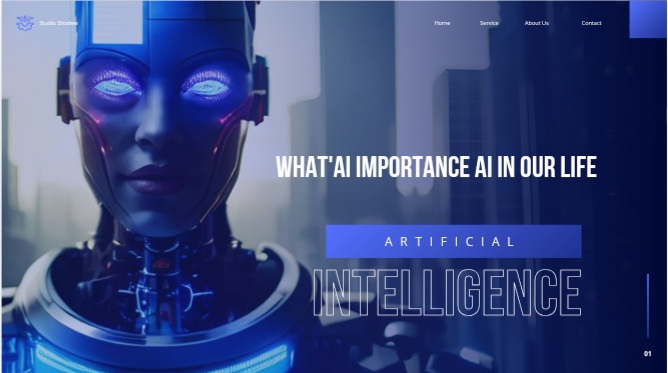What’s importance AI in our life?
Artificial Intelligence (AI) is rapidly transforming various facets of human life, from the way we work and communicate to how we access healthcare and entertainment. As a broad branch of computer science, AI refers to the creation of machines and systems capable of performing tasks that typically require human intelligence. These tasks include problem-solving, understanding natural language, recognizing patterns, learning from experience, and making decisions. The importance of AI in our lives today is undeniable, as it touches nearly every industry and significantly improves efficiency, decision-making, and overall quality of life.
AI in Healthcare
One of the most important contributions of AI is in the healthcare sector. AI-powered systems and tools help in diagnosing diseases, predicting patient outcomes, and recommending treatments. For instance, AI algorithms can analyze medical images, such as MRIs or CT scans, to detect abnormalities that might be missed by human eyes. This leads to early detection of conditions like cancer, significantly improving survival rates. Moreover, AI is also being used to develop personalized treatment plans by analyzing vast amounts of data related to a patient’s genetics, lifestyle, and medical history. AI-driven innovations are leading to more accurate, efficient, and cost-effective healthcare solutions, thus enhancing patient care globally.
AI in Education
Education is another area where AI is making a huge impact. Intelligent tutoring systems are designed to provide students with personalized learning experiences. These systems analyze the learning pace and style of each student and offer tailored exercises and lessons. AI also enables the automation of administrative tasks, such as grading and student assessments, freeing up time for educators to focus more on teaching and mentoring. Additionally, AI-driven language translation tools help break down barriers for students learning in foreign languages, opening up access to educational resources globally. In the future, AI could provide even more immersive and adaptive learning environments through virtual reality (VR) and augmented reality (AR).
AI in Daily Convenience and Automation
In our daily lives, AI-powered virtual assistants like Siri, Google Assistant, and Alexa have become indispensable. These AI-driven systems help us set reminders, control smart home devices, find information, and even shop online. Similarly, recommendation algorithms on platforms like Netflix, YouTube, and Amazon provide personalized content, making it easier to find relevant movies, videos, or products. Beyond just convenience, AI is powering the automation of everyday tasks. For instance, autonomous vehicles, once a sci-fi concept, are becoming reality with AI algorithms allowing cars to navigate roads, make decisions, and ensure passenger safety.
AI in Business and Industry
In the business world, AI is a game-changer, especially when it comes to data analysis, marketing, and customer service. AI tools analyze vast amounts of data to identify trends, improve business strategies, and predict consumer behavior. AI chatbots and virtual agents are enhancing customer service experiences by providing real-time assistance and addressing queries without human intervention. In industries such as manufacturing, AI-powered robots are improving production efficiency and quality by taking over repetitive tasks, which reduces the risk of human error and fatigue.
The Ethical Considerations
Despite its numerous advantages, the integration of AI into daily life also raises ethical concerns. Issues such as data privacy, security, and the potential for job displacement due to automation need to be carefully addressed. Furthermore, the risk of biased AI algorithms, which may reinforce societal inequalities, is a critical concern. It is important to develop AI systems that are transparent, accountable, and aligned with ethical standards to ensure that they benefit all of humanity.
AI has become an integral part of modern life, enhancing healthcare, education, daily convenience, and business operations. Its ability to process data, automate tasks, and improve decision-making has significantly transformed industries, making them more efficient and adaptive. However, as AI continues to evolve, it is crucial to address the ethical and social implications it presents, ensuring that its benefits are inclusive and fair for all. Ultimately, AI holds the potential to create a future where human ingenuity is amplified and our lives are made better in numerous ways.
